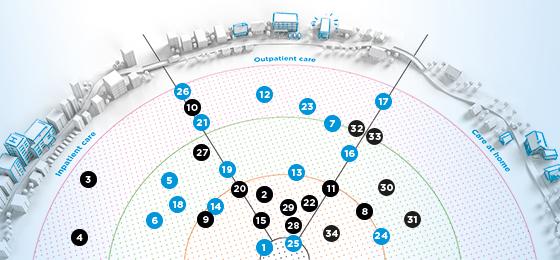Four research projects present their findings

The projects covered diverse topics in inpatient and outpatient settings, from interprofessionality and case management to measurement and reporting.
The projects funded by NRP 74 started at two points in time (2017 and 2019) and last between two and five years. They finish at different times.
Overview of the four recently completed projects:
Project 5: Case management in emergency departments
Case management reduces the number of ED visits and promotes patients' quality of life in frequent users
Most emergency departments (ED) in Switzerland are overloaded. This is explained in part by a minority of patients making above-average use of EDs. Introducing a type of case management response may help address complex needs of this population.
More information on the study:
Project 17: Diagnosing Dementia
An improved dementia diagnosis requires a closer cooperation of health and social actors
Dementia diagnosis raises a range of political and normative questions. Its implementation involves both the health and social/care sectors and entails various practical dilemmas. This study analysed how the Swiss cantons handle this topic, especially early diagnosis, and the main ethical issues faced by health systems professionals in this context.
More information on the study:
Project 18: Interprofessional discharge planning
Interprofessional discharge planning reduces length of hospital stay
Delayed discharge of medically stable patients in acute hospitals is detrimental to their recovery process and costly for society. Thanks to the introduction of an innovative interprofessional tool for planning hospital discharge ("In-HospiTOOL"), one third of these delays can be avoided.
More information on the study:
Project 21: Standardised Assessment and Reporting System of functioning
Standardised assessment and reporting system for functioning information supports quality reports and individual rehabilitation
The aim of rehabilitation for people with a health problem is to optimise what they can and want to do in everyday life. Such information is referred to as “functioning information” and assessed with various data collection tools. A standardised assessment and reporting system (StARS) allows the comparison of such functioning information throughout treatment regardless of the data collection tool used.
More information on the study:
The results of further research projects are expected in the course of next year.
